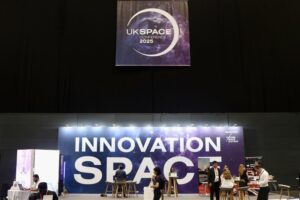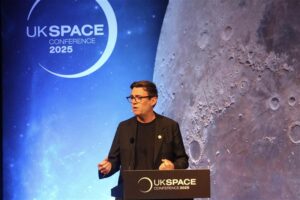
On 16 to 17 July 2025, Manchester proudly hosted the prestigious UK Space Conference, the United Kingdom’s premier space sector event that brings together industry leaders, policymakers, researchers and international stakeholders. With thousands of delegates arriving from across the UK and beyond, the conference not only cemented Greater Manchester’s growing influence in the £18.9 billion UK space industry but also demonstrated the region’s strategic importance to the future of global space innovation.
For Greater Manchester, the conference was more than a landmark event. It was a catalytic opportunity to align the city region’s existing strengths in advanced materials, manufacturing, digital technologies, cyber security and data science with one of the fastest growing industries worldwide. The space sector’s direct synergies with these sectors are foundational to the future of space exploration, satellite technology and putting the UK at the forefront of the emerging global space economy.

Hosting the UK Space Conference brought significant economic value to Greater Manchester. The influx of delegates, businesses and decision-makers generated direct spending across venues, hospitality and transport. More importantly, it created meaningful connections and commercial opportunities for local firms, innovators and research institutions, including The University of Manchester and the Graphene Institute, both critical contributors to the regional and national space ecosystem.
The conference was supported by Manchester Accommodation BID, whose backing was instrumental in securing the event for the city.

Throughout the week, the UK Space Conference featured a packed programme of keynote sessions, panel discussions, networking events and exhibitions, focusing on how the UK’s space sector can drive national security, economic growth and innovation. One of the most impactful sessions was the ‘Space for Growth’ panel on Thursday, where Andy Burnham, Mayor of Greater Manchester, articulated the region’s ambition to leverage the space sector as a driver for innovation, skills development and economic growth across the North.
Andy Burnham, Mayor of Greater Manchester said:
“We have space for further growth, and it is brilliant to host this prestigious event. Manchester is the fastest growing city region with 3.1 percent year-on-year growth, and I believe the next decade will be the best we have seen since the industrial revolution. Our history with space, from creating space suits for moon missions to pioneering Graphene applications, demonstrates our capacity for innovation. Atom Valley, for instance, is set to become a key site for space industry innovation and research, creating a industrial cluster for the UK. Manchester has always fearlessly faced the future, and the future points to space.”
The Mayor also highlighted the recent Memorandum of Understanding signed with US-based Axiom Space, in partnership with the Mayor of Liverpool, securing the North-west of England a significant role in developing the world’s first commercial space station.

Chris Bryant, Minister of State for Data Protection and Telecoms, reinforced the importance of space to the UK’s national interests, stating:
“It is important to our daily lives and economy to ensure the UK is one of the best places globally for space innovation. Our focus must be on three priorities: national security, economic growth and leveraging UK advantages such as Launch capabilities. A whole of government approach, underpinned by procurement, investment and innovation, will be key to delivering growth.”
Several discussions throughout the conference acknowledged the challenges facing the space sector: its relatively small scale, fragmented funding streams and supply chain vulnerabilities. The need to support the entire value chain, invest in skills and foster innovation was a recurring theme. Yet, speakers stressed that space is a ‘secret value’ enabler for society, underpinning services from communications and data to defence, green energy and even seed propagation.
Greater Manchester’s space ecosystem has been steadily developing over the past decade. Business clusters like the Oxford Road Corridor have created thriving communities where academic expertise, state of the art facilities and commercial potential work together. This clustering effect not only strengthens the space sector but also drives innovation in non-space industries, showcasing the city region’s broader economic influence.
Beyond the immediate commercial benefits, the conference inspired region-wide outreach and education initiatives. In collaboration with Jodrell Bank and the University of Manchester, the conference delivered school workshops that introduced young people across Greater Manchester to space science and STEM careers. Pupils met working astronauts and engaged with hands-on space science activities, further embedding a future pipeline of talent.
Hosting the UK Space Conference has firmly positioned Manchester as a leader in the UK for business, innovation and international events. The event’s success is a blueprint for how Greater Manchester can continue to harness its strengths, attract global attention, foster inward investment and create opportunities for local businesses in high growth sectors like space.
